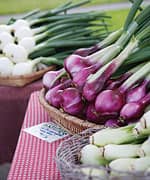Life Extension Magazine®
Consuming plenty of onions may be one key way to help guard against cancer and heart disease—the two leading causes of death in the United States. Onions and their close cousin garlic (both members of the allium family) have been an important part of healthy diets and natural medicine since ancient Egyptian times. The reputed antibacterial, antiseptic, and antifungal qualities of this vegetable also led to its use during World War II for wound healing in the field by Russian and British soldiers. Today, many of the phytonutrients found in onions (and garlic) are recognized as valuable in the prevention and management of conditions such as cancer, type 2 diabetes, cardiovascular disease, and hypertension.1, 2 Many of onions’ healthful qualities arise directly from the vegetable’s pungent-scented phytonutrients.3 Two of the most important types of chemicals in onions are flavonoids, which are responsible for their red, yellow, and brown colors, and organosulfur compounds, sulfur-containing constituents that impart the strong flavors.4, 5 Cancer ProtectionA key property of onions and other members of the onion family is their ability to help prevent and manage a variety of cancers, as research has revealed.6,7 A study of French women found that those who consumed more onions and garlic had a lower risk of breast cancer.8 The combination of the flavonoid quercetin—which occurs abundantly in onions—along with curcumin (an ingredient in curries made with turmeric) also had a profound effect in adults with the genetic disorder that increases colon cancer risk (familial adenomatous polyposis). The nutrient combination dramatically reduced the number of polyps characteristic of the disease—an important finding, since these polyps often precede colorectal cancer.9 Furthermore, several studies indicate that onions can effectively prevent stomach cancer, which is the second leading cause of cancer death worldwide.10,11 The protective effects of this vegetable have also shown promise in esophageal cancer,12 prostate cancer,13,14 and ovarian, kidney, and oral cancers.7
Safeguarding Cardiovascular HealthRegularly enjoying onions may provide multifaceted support for cardiovascular health. Administration of a sulfur-containing amino acid derived from onions to diabetic animals produced significant reductions in blood glucose and lipid levels. Such effects could provide important protective benefits to diabetic patients, who suffer a dramatically increased risk for cardiovascular disease.15 Onion is a rich source of bioavailable quercetin, a flavonoid that may be highly beneficial for the cardiovascular system. Scientists have reported that quercetin may help prevent the oxidation of low-density lipoprotein (LDL), thus protecting against an important contributor to atherosclerosis.16 Onions might even protect against high blood pressure, an important predictor of heart attack and stroke. Animals prone to hypertension derived significant protection when they consumed a diet containing raw onions.17 Nutritional Content of OnionsOnions are not only flavorful, they are also a nutritional powerhouse. In addition to healthful flavonoids and sulfur-containing compounds, onions contribute potassium, vitamin C, folic acid, zinc, selenium, and fiber to the diet. Furthermore, onions are fat-free, cholesterol-free, and low in sodium.18
Enjoying OnionsOnions make a delicious addition to all kinds of dishes, including: soups and stews; meats and poultry; salads and sandwiches; as well as sauces and garnishes. The nutrient values in onions are highest when ripe, raw, and freshly picked. Nutrients diminish during storage, so onions should not be used when they have begun to sprout or develop soft spots. Sweet summer onions should be kept refrigerated, whereas yellow, white, and red onions are best stored in an open-air container, such as a hanging wire basket, away from moisture (and away from potatoes). Although most onions remain stable for long periods of time in dry storage, once cut, the nutrients rapidly escape through oxidation, even when stored tightly wrapped in the refrigerator. Rinsing cut onions in water washes away valuable nutrients, as does cooking in water, although cooking water may be used in soups or sauces to capture the nutritional benefits. High heat can cause onions to turn bitter, so gentle cooking is advised. If bad breath is the only thing keeping you from enjoying the broad benefits of onions, try following your meal with a touch of parsley—just nibble the garnish on restaurant plates to freshen your breath!
Trish Riley writes about health and environmental issues and is the author of The Complete Idiot’s Guide to Green Living (Alpha Books, 2007). If you have any questions about the scientific content of this article, please call one of our Health Advisors at 1-800-226-2370. | ||||||||||||||||||||||||||||||||||||||||||||||||||||||||||
| References | ||||||||||||||||||||||||||||||||||||||||||||||||||||||||||
| 1. Lanzotti V. The analysis of onion and garlic. J Chromatogr A. 2006 Apr 21;1112(1-2):3-22. 2. Rose P, Whiteman M, Moore PK, Zhu YZ. Bioactive S-alk(en)yl cysteine sulfoxide metabolites in the genus Allium: the chemistry of potential therapeutic agents. Nat Prod Rep. 2005 Jun;22(3):351-68. 3. Jones MG, Hughes J, Tregova A, et al. Biosynthesis of the flavour precursors of onion and garlic. J Exp Bot. 2004 Aug;55(404):1903-18. 4. Griffiths G, Trueman L, Crowther T, Thomas B, Smith B. Onions—a global benefit to health. Phytother Res. 2002 Nov;16(7):603-15. 5. Keusgen M, Schulz H, Glodek J, et al. Characterization of some Allium hybrids by aroma precursors, aroma profiles, and alliinase activity. J Agric Food Chem. 2002 May 8;50(10):2884-90. 6. Patel D, Shukla S, Gupta S. Apigenin and cancer chemoprevention: progress, potential and promise (review). Int J Oncol. 2007 Jan;30(1):233-45. 7. Galeone C, Pelucchi C, Levi F, et al. Onion and garlic use and human cancer. Am J Clin Nutr. 2006 Nov;84(5):1027-32. 8. Challier B, Perarnau JM, Viel JF. Garlic, onion and cereal fibre as protective factors for breast cancer: a French case-control study. Eur J Epidemiol. 1998 Dec;14(8):737-47. 9. Cruz-Correa M, Shoskes DA, Sanchez P, et al. Combination treatment with curcumin and quercetin of adenomas in familial adenomatous polyposis. Clin Gastroenterol Hepatol. 2006 Aug;4(8):1035-8. 10. Setiawan VW, Yu GP, Lu QY, et al. Allium vegetables and stomach cancer risk in China. Asian Pac J Cancer Prev. 2005 Jul;6(3):387-95. 11. Dorant E, van den Brandt PA, Goldbohm RA, Sturmans F. Consumption of onions and a reduced risk of stomach carcinoma. Gastroenterology. 1996 Jan;110(1):12-20. 12. Gao CM, Takezaki T, Ding JH, Li MS, Tajima K. Protective effect of allium vegetables against both esophageal and stomach cancer: a simultaneous case-referent study of a high-epidemic area in Jiangsu Province, China. Jpn J Cancer Res. 1999 Jun;90(6):614-21. 13. Hsing AW, Chokkalingam AP, Gao YT, et al. Allium vegetables and risk of prostate cancer: a population-based study. J Natl Cancer Inst. 2002 Nov 6;94(21):1648-51. 14. Colli JL, Colli A. International comparisons of prostate cancer mortality rates with dietary practices and sunlight levels. Urol Oncol. 2006 May;24(3):184-94. 15. Kumari K, Mathew BC, Augusti KT. Antidiabetic and hypolipidemic effects of S-methyl cysteine sulfoxide isolated from Allium cepa Linn. Indian J Biochem Biophys. 1995 Feb;32(1):49-54. 16. Hollman PC, Katan MB. Bioavailability and health effects of dietary flavonols in man. Arch Toxicol Suppl. 1998;20:237-48. 17. Kawamoto E, Sakai Y, Okamura Y, Yamamoto Y. Effects of boiling on the antihypertensive and antioxidant activities of onion. J Nutr Sci Vitaminol (Tokyo). 2004 Jun;50(3):171-6. 18. Available at: http://www.onions-usa.org/about/nutrition.asp. Accessed July 12, 2007. |




